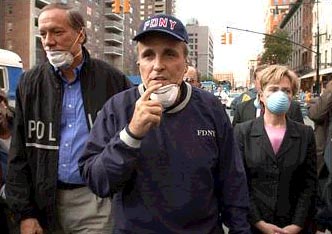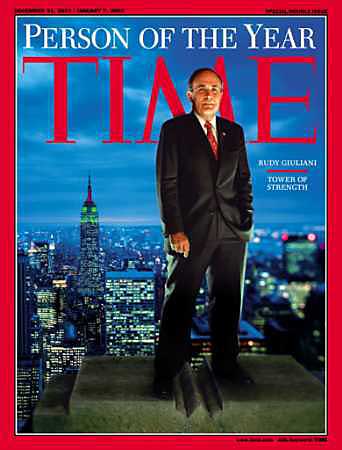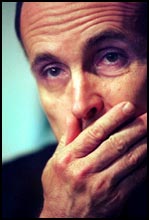

Rudy G. As Time's Person of the Year
by Joseph C. Hinson
December 23, 2001
Rudolph Giuliani, the esteemed Mayor of New York, was hailed as Time Magazine's Person of the Year. The magazine lauded Giuliani for his ability to be both a strong leader and a comforting force to a city devastated by the terrorist attacks on the World Trade Center.
"I feel that this award is intended for all of the people of New York who defended the spirit of America and have helped to make the American spirit stronger than it has ever been before," he said at a news conference surrounded by members of his staff on Sunday.
"When I first reflected on it, I thought it really strange, you know," he said. "It's hard to think of yourself that way. And then it didn't seem as strange when I just started thinking of it in terms of the people of New York City. ... If something really goes wrong in the city, you have a right to blame the mayor, right? So I got all the credit, resting on the shoulders of these people that have had one of the most heroic three months I think any people have ever had."
The editors of Time said they picked Giuliani because he represented the spirit that came together in the United States after the attacks.

At 9:05 p.m. Wednesday 9/12, Rudy Giuliani finally broke. Exactly 36 hours after he first rushed to the World Trade Center, the mayor’s neo-Churchillian reputation was already secure. He had just escaped injury or death in The Attack, calmly led a terrifying retreat uptown, then inhabited the role of wartime leader with a fine mixture of brisk compassion and gritty command presence. (Johnathan Alter -- Newsweek)
Who Is Rudy G?
Rudolph W. Giuliani was born to a working class family in Brooklyn, New York in 1944. He attended Bishop Loughlin Memorial High School (Class of '61) in Brooklyn, Manhattan College (Class of '65) in the Bronx and New York University Law School in Manhattan, graduating magna cum laude in 1968.
After graduating, Rudy Giuliani clerked for Judge Lloyd MacMahon, United States District Judge for the Southern District of New York. In 1970, Giuliani joined the office of the U.S. Attorney. At age 29, he was named Chief of the Narcotics Unit and rose to serve as executive US Attorney. In 1975, Giuliani was recruited to Washington, D.C., where he was named Associate Deputy Attorney General and chief of staff to the Deputy Attorney General. From 1977 to 1981, Giuliani returned to New York to practice law at Patterson, Belknap, Webb and Tyler.
In 1981, Giuliani was named Associate Attorney General, the third highest position in the Department of Justice. This was under Reagan's Attorney General, Ed Meese. As Associate AG, Giuliani supervised all of the US Attorney Offices' Federal law enforcement agencies, the Bureau of Corrections, the Drug Enforcement Agency, and the US Marshals.
In 1983, he was appointed US Attorney for the Southern District of New York, where he spearheaded the effort to jail drug dealers, fight organized crime, break the web of corruption in government, and prosecute white-collar criminals. Few US Attorneys in history can match his record of 4,152 convictions with only 25 reversals.
In 1998, Giuliani entered the race for mayor of New York City as a candidate of the Republican and Liberal parties, losing by the closest margin in City history to Democrat David Dinkins. However in 1993, his campaign focusing on quality of life, crime, business and education made him the 107th Mayor of the City of New York. In 1997 he was re-elected by a wide margin, carrying four out of New York City's five boroughs.
Rudy G.'s term has not been without some controversy. On Friday, August 8, 1997, New York police officers assaulted Abner Louima. That night, Abner Louima was allegedly subjected to the kind of cruel, brutal beating, and torture, which he thought he had forever avoided when he and his family left Haiti for the United States in 1990. Abner Louima was allegedly beaten and sodomized with the wooden handle of a toilet plunger by the law enforcement officers of the government he trusted: some uniform members of the New York City Police Department (NYPD). Even more disturbing was that this alleged atrocity was not committed in the shadows of a back alley, but in a brightly-lit police precinct station house in the middle of their neighborhood in Brooklyn. And, some of what allegedly happened that night may have been witnessed by some of the police officers of the 70th Precinct who were on duty.
Then it got worse. A supervisor at the 70th Precinct allegedly attempted to make false statements against Louima, and a second man, Patrick Antoine, who also was arrested that night. Then, the Police Department's Internal Affairs Bureau, which is supposed to be the first line of defense against corrupt and brutal police officers, ignored at least one caller reporting the incident.
Sadly, allegations of police misconduct are not new, nor unique, in New York City history. From July 1993 through June 1997, approximately 20,535 complaints were filed with the Civilian Complaint Review Board against individual police officers. Additionally, in the year before this report came out, the city paid out $27.3 million to people who say the police violated their rights.
While Giuliani came out against the attack, some thought it was too little too late. They said that his crackdown on crime may have had unintended effects, such as the adverse relationships between police and minorities. Some say these problems persist to this day. Odd, for a man who has been crusading against crime and criminals for most of his life. That seems to stop, however, when the criminals wear badges.
In May, 1998, Giuliani proposed legislation that would allow "domestic partners' the same rights as married couples. This would also encompass gay couples. I don't know what came out of it. I'm in too much of a bad mood -- plus a stomach ache -- to keep up all these damn Google searches.
In January, 1999, New York City began shipping its trash to Virginia. It became a battle of the states. Said The Mayor, "People in Virginia like to utilize New York because we're a cultural center, because we're a business center. What goes along with being a cultural and a business center is you're very crowded, and we don't have the room here to handle the garbage that's produced, not just by New Yorkers, but by the three million more people that come here and that utilize the place every day. So this is a reciprocal relationship."
The governor of Virginia, James S. Gilmore III, responded with a letter to Giuliani, a fellow Republican. He said: "Like millions of people living from Maine to Florida, I am offended by your suggestion that New York's substantial cultural achievements, such as they are, obligates Virginia and other states to accept your garbage. Let me assure you that the home state of Washington, Jefferson, and Madison has no intention of becoming New York's dumping ground."

In February, 1999, four white police officers in plainclothes approached Amadou Diallo outside his apartment building in the South Bronx at about 12:45 a.m. They shoot him down in a barrage of 41 bullets, 19 of which strike the intended target. Diallo, a 22-year-old street peddler, was unarmed and had no criminal record. The next day as news spread across the nation, Giuliani tells New Yorkers not to rush to judgment. The relationship between the Mayor and minorities in his city further deteriorate after this spectacle. A year later, it didn't help that the four officers involved got off free.
In late 1999, Giuliani was at the heart of a censorship charge when the Brooklyn Museum of Art featured the work of young British artists from the contemporary art collection of British advertising executive Charles Saatchi. Mayor Giuliani denounced the art, which includes a painting of a black Virgin Mary that incorporates elephant dung, as "sick stuff," and is attempting to yank the museum's funding and terminate its lease. Further, the Mayor has said he would also cut off city financing to any other publicly supported cultural institution that mounts an exhibit that he considers an attack on religion. This, of course, is counter to a document known as the Constitution, specifically the First Amendment. In its brief, civil liberties groups argued that "the record, in this case, demonstrates clearly that the Mayor has flagrantly violated this well-established First Amendment prohibition against viewpoint discrimination."
As always, the right to free speech won. But The Mayor wasn't finished. In March, 2000, he joined the fray against Hans Haacke's piece, called Sanitation, on display at the Whitney Museum. It was a collection of garbage cans, U.S. flags and Gothic-scripted quotations from American politicians attacking contemporary art, among them Jesse Helms, Pat Buchanan, Jesse Helms and Giuliani himself. Coming on the heels of the Brooklyn Museum of Art debacle, it is curious to say the least that the Mayor would fight free speech, as it were, so soon.
My Take on Giuliani
I don't have to agree with Rudy G. on everything to like him. Overall, he has done a good job for New York. Crime is lower. That may be because the cops are killing the bad guys and the good guys. But bottom line, crime is lower. One doesn't have to do more than watch an early "Law & ORder" and then watch a more recent "Law & Order" to see how much the Big Apple has changed.
Frankly, I was pulling for him over Hillary Clinton in the New York Senate race. For one thing, at least he was a New Yorker! But I think he represents America between than Ms. Clinton. He was diagnosed with prostrate cancer before the race got going good and pulled out, to be replaced by someone whose name I can't remember right now. Clinton went on to win.
Had Rudy stayed in the race, he may have won. Had he won, he would not have been mayor during the 9/11 tragedies. All in all, I think he won out and America won out. In time, I hope we see him back on the political stage. Can anyone say President Giuliani?
Online Sources:
NYC
Mayor Rudy Giuliani Named Time's Person of the Year
Lifesaver
Hero: Rudolph Giuliani
New
York Daily News Online Edition
Rudy
For President
BBC
Profile: Rudolph Giuliani
PBS
Interviews: Mayor Rudolph Giuliani (pre-9/11)
Text:
Giuliani at the United Nations (October 1, 2001)
Text:
Giuliani on Rescue Efforts (September 12, 2001)
Deflecting
Blame: The Dissenting Report of Mayor Rudolph W. Giuliani's Task Force
on Police
Giuliani's
Pro-Censorship Views Need Balance on Sunday Shows (October 8, 1999)
Giuliani:
The Hits Keep On Coming (An alternate view of the mayor.)
It's
All Over, Rudy (A dissenting view from Jeff Alan, pre-9/11)
Days
of their Lives (Soap opera-ish look at his divorce.)
Hans
Haacke and the Art of Being 'Provocative'
The
Mayor V. Brooklyn Museum of Art
Person
of the Year: Covers Through the Ages
to
my next rant (when
posted)
My
Rants and Raves
The
Joseph C. Hinson Home Page